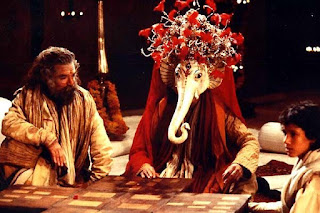Peter Brook: 1925-2022
"In a dishonourable age it is challenging and stimulating to be reminded of finer attitudes. Each person can measure himself and see what he would most essentially respect when he is faced by a level of behaviour that is more dedicated, goes further than his own.... When somebody reaches a certain very high level he becomes so close to truth that he is incapable of speaking anything other than the truth." (Peter Brook)
When Peter Brook said this, he was talking about the ideas behind Mahabharata, which he famously staged in the 1980s, but his words apply just as powerfully to his own long life, which has now ended at the magnificent age of 97. I feel rather ashamed that, as long ago as 1995, I was quoted in The Deccan Herald as admiring his professional longevity, still directing in his early 70s. Nearly 30 years later, he still hadn't stopped. Of course he hadn't. Brook could no more stop directing theatre than a Zen master can retire from meditation: it wasn't a job, but a way of being. Only a few months ago, he was directing our friend and collaborator Ery Nzaramba as Prospero in his Tempest Project, with not a hint of any sentimental and wistful self-portraiture about "the farewell to the theatre". All the same, I like the fact that The Tempest should have been his final piece: a great text about theatre, colonialism, freedom, cultural difference, magic and the spirit. These were the subjects that dominated his work.
 |
| Ery Nzaramba as Prospero |
"Today" he wrote in There Are No Secrets, "the world offers us new possibilities... Nothing is more vital to the theatre culture of the world than the working together of artists from different races and backgrounds." (p.94)
Of course I agree. And I remain deeply grateful to Brook for having pioneered intercultural performance as an ideal, and as a necessary response to the post-colonial globalised moment. At the same time, I feel wary of some of what he was trying to achieve (and indeed, did achieve) through cross-cultural collaboration. Mahabharata was a revelation to me in the 80s, when I hadn't even heard of the great poem, but it was also, as Rustom Bharucha famously showed, a diminution of the Indian myth filtered through the lens of Western tragedy, both Shakespearean and Biblical. Brook's engagement with non-Western cultures could often seem exotic and romanticised, as if their raison d'être was to serve as a correctional mirror for the decadent West. For example, in 1989 he told Véronique Hotte:
"In Third World countries, which are at heart 'traditional', tradition offers a defence against confusion and chaos, against modern life and its formlessness. This kind of tradition generates very pure currents which give meaning to life." (David Williams:Peter Brook - A Theatrical Casebook. p.404)
For all his desire to engage with artists from a range of cultural backgrounds, it was not the culture itself that interested Brook, but the desire to move beyond culture to some supposed "human essence", something that he regarded as "universal". The truth is that this is impossible: any theatrical endeavour requires the use of language, gesture, colour, music, all of which carry specific cultural meanings. The "universal" often looked uncomfortably like Western culture being read onto non-Western bodies. For me, Brook's work was most potent when it acknowledged the semiotics of the body and of distinct cultures, when the performers drew off their differences rather than their similarities. I recall his wonderful production of the South African anti-apartheid play Sizwe Bansi is Dead at the Pit - or the extraordinary scream of Rwandan actor Carole Karemer in Battlefield, which so clearly drew off the recent past of her people. I think of Mallika Sarabhai as Draupadi in Mahabharata - the only Indian in the cast, and so the central symbol of integrity. I think of Mozart's score, so emphatically European, holding together his gentle and thoughtful Magic Flute.
 |
| The Mahabharata, directed by Peter Brook |
"Once, in the Sahara, I climbed up a dune and, looking down, saw that the hollow in front of me was very deep. I slithered down the sandy wall, and when I reached the bottom I was completely isolated from the desert, and all its tiny sounds had vanished. There, for the first time, I actually experienced the living presence of total silence.... A touching old English saying arises in my mind: 'Words fail me'. So this is the moment to end. The most precious thing is: 'Keep Silence.'" (p.138-9)


1 comment:
A beautiful tribute to the master. As with Mr Brook's theatre, Michael too draws on diverse viewpoints and references to acknowledge Brook's imagination and realization of theatre.
Post a Comment